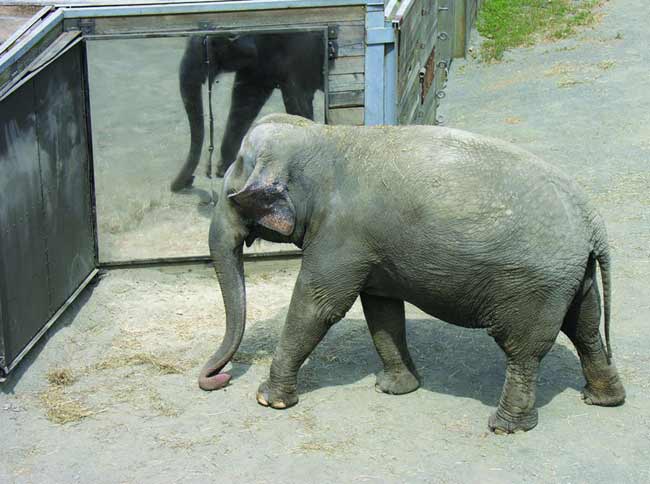Elephant Self-Awareness Mirrors Humans

Elephants can recognize themselves in a mirror, joining only humans, apes and dolphins as animals that possess this kind of self-awareness, researchers now report.
"This would seem to be a trait common to and independently evolved by animals with large, complex brains, complex social lives and known capacities for empathy and altruism, even though the animals all have very different kinds of brains," researcher Diana Reiss, a senior cognitive research scientist at the Wildlife Conservation Society in Brooklyn, N.Y., told LiveScience.
Hopefully, she added, this will encourage people to protect elephants.
The researchers began their experiment by introducing three adult female Asian elephants to a mirror [image] eight feet wide by eight feet high constructed in a private area of their yard at the Bronx Zoo. Making the jumbo-sized mirror as "elephant-resistant" as they could was a challenge, given that "elephants love to constantly push with their heads and manipulate anything they can," explained researcher Joshua Plotnik, a graduate student at Emory University in Atlanta.
"We used a mirror made of plastic -- if we used glass, it would have broken very easily -- and framed it with steel and bolted it to the wall, but we were still worried they'd bring it down," Plotnik told LiveScience. "Luckily that didn't happen. We never saw them attempt to rip the mirror off. They seemed too interested in it to do that."
One of the first things animals capable of recognizing themselves in mirrors do is try exploring the other side of the mirror. Elephants Maxine and Patty did this [video]: they swung their trunks over and behind the wall on which the mirror was mounted, kneeled in front of it to get their trunks under and behind it, and even attempted to physically climb the wall. Remarkably, the elephants did not appear to at first mistake their reflections as strangers and try to greet them, as many animals that can recognize themselves normally do.
"Elephants have been tested in front of mirrors before, but previous studies used relatively small mirrors kept out of the elephants' reach," he added. "This study is the first to test the animals in front of a huge mirror they could touch, rub against and try to look behind."
Sign up for the Live Science daily newsletter now
Get the world’s most fascinating discoveries delivered straight to your inbox.
As they begin to understand mirrors, animals that can recognize their reflections try repeating actions in front of it. The elephants, for example, waved their trunks around and moved their heads in and out of the mirror view.
Finally, once animals recognize reflections as their own, they use mirrors to investigate their own bodies [video]. On more than one occasion, the elephants stuck their trunks into their mouths in front of the mirror, and Maxine used her trunk to pull her ear slowly toward the mirror.
"As a result of this study, the elephant now joins a cognitive elite," said researcher Frans de Waal at Emory University.
One elephant, named Happy, passed the final test of repeatedly touching an X painted on her forehead [image], a place she could not see without a mirror. As a control, when a colorless paint was used to draw the X, Happy didn't bother with it. While only Happy passed this test [video], the researchers noted that more than half of chimpanzees examined typically fail this test.
"Also, while primates constantly groom themselves, elephants love to throw mud on themselves and bathe in dust, so the other elephants might have seen that mark on their heads and not cared," Plotnik said.
Future research can focus on when elephants first develop this capacity. "We first see evidence of humans recognizing their reflections when they are 18 months old," Reiss said.
The scientists reported their findings online October 30 via the Proceedings of the National Academy of Sciences.
- Elephant Said to Speak
- Elephant Mimics Truck Sounds
- Images: The World's Biggest Beasts
- Buy Hot Sauce, Save an Elephant
- Top 10 Animal Senses that Humans Don't Have










